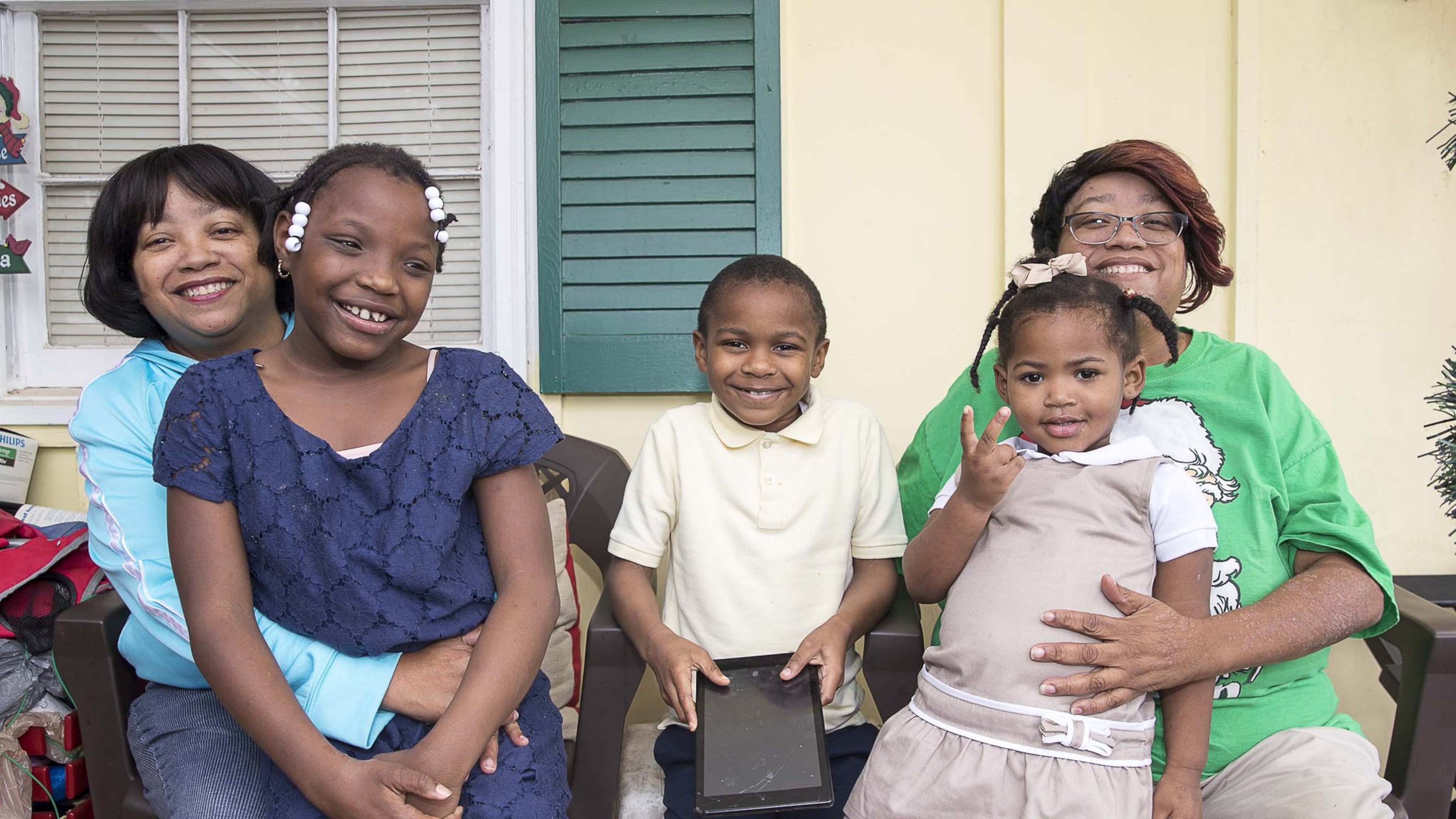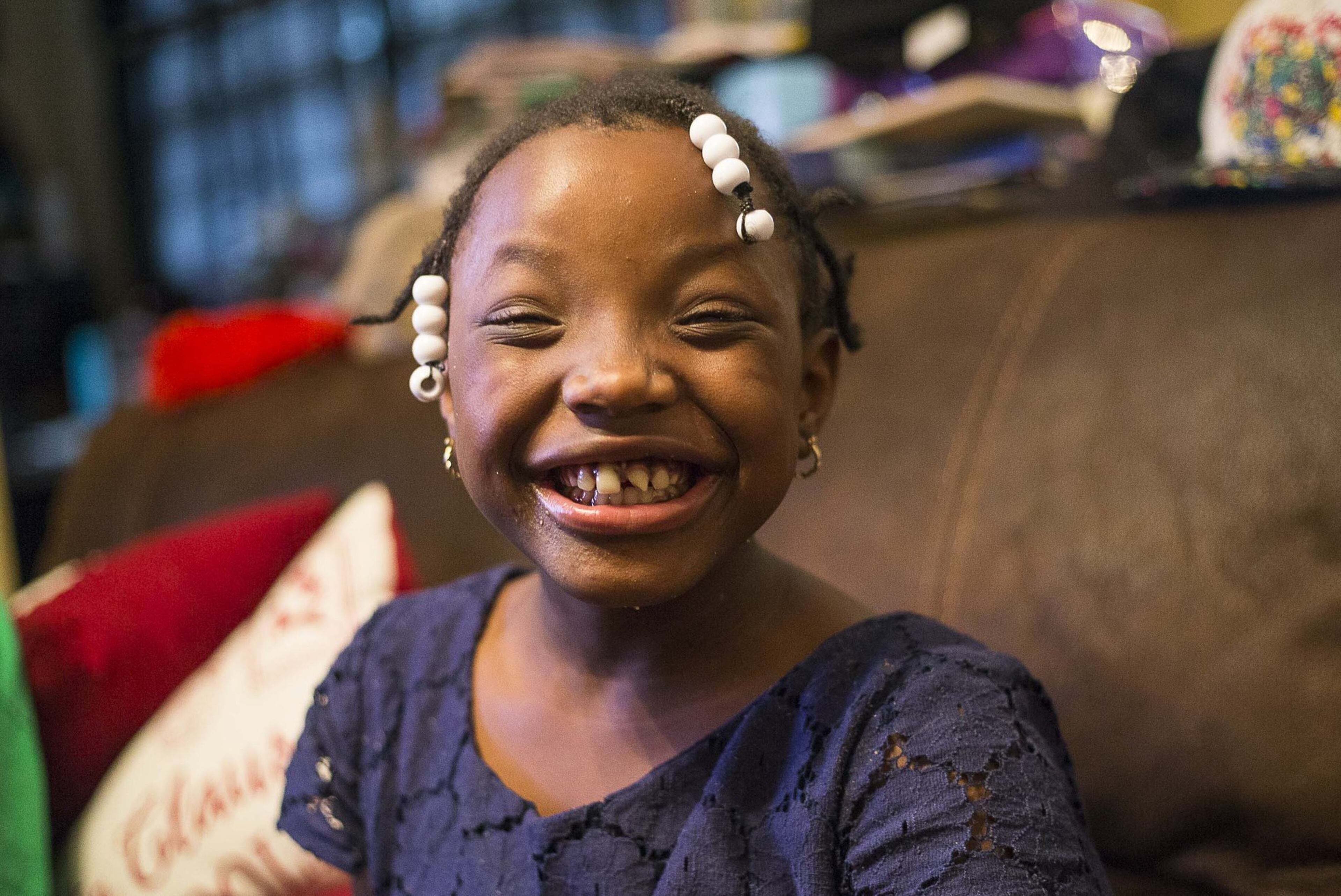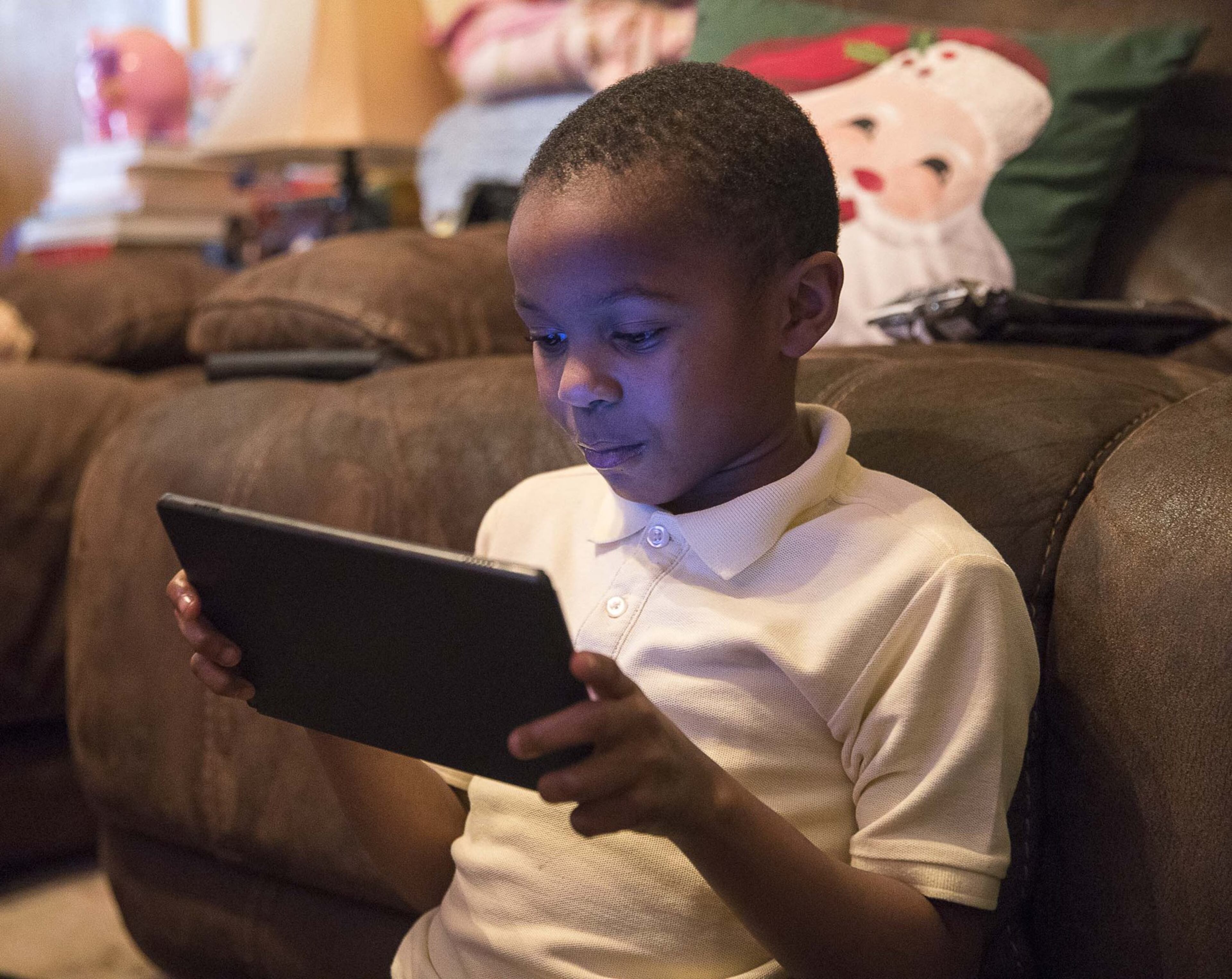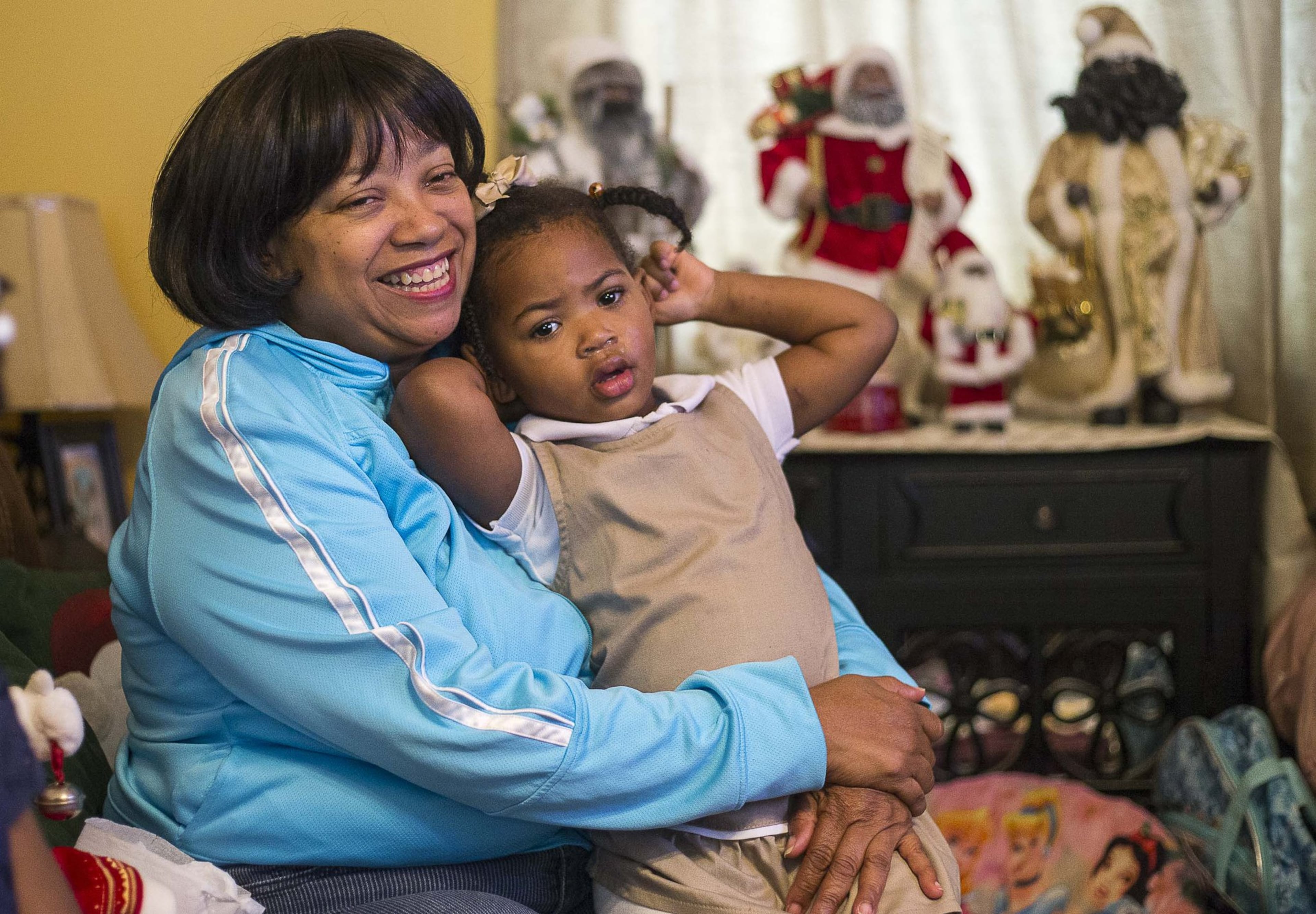Double the maternal love: Twin sisters stepped in to help family, then fostered many more children

Everyone deserves to feel wanted and loved.
This isn’t just a mantra for twin sisters Patricia and Priscilla Moses. It is an answer. Why have they fostered over 20 children and adopted three? Because, they say, everyone deserves to feel wanted and loved.
Their parenthood journey is not one they expected, but they’re grateful and believe God has mapped out every step. Fostering has been riddled with harrowing experiences for the Moses twins, but it is also what led them to find their forever family.
Patricia and Priscilla, 52, are known to their friends as Patty and Prissy. In the spring of 1989, the ladies moved from Alexandria, Louisiana, where they were born and raised, to Decatur. They were hoping for good jobs and new adventures. With her degree in rehabilitation from Louisiana State University, Patty first landed a job as a rehab aide, then as a rehab administrative assistant and then as a medical biller. Prissy, who had dreams of getting married and starting a family, found a job as a presser at a dry cleaners, followed by a couple of different staff positions at Children’s Healthcare of Atlanta at Scottish Rite.
The sisters shared an apartment and spent their free time together. They ate out often and frequented concerts at the King Center. They especially loved the gospel singers.
They had lived in Georgia for three years when they received a call from the Department of Children and Family Services in Louisiana. It was a Thursday. The agency said if they didn’t pick up their cousin’s children, a 1-year-old boy and a 3-year-old girl, they would be wards of the state by Monday. By Saturday, they were a family of four, driving back to Georgia.
Embracing parenthood
The next few years were a big transition for all of them.
“Sharnika and Corey were loved, but their mom was struggling,” said Patty. “When we brought them to our home, they were filthy. They had impetigo (a highly contagious skin infection) and no sense of routine.”
The sisters’ days of eating out and living the single life were replaced with potty training, disciplining and entertaining little ones. Patty and Prissy made constant efforts to assure the kids they were safe and had everything they needed. Due to their mom’s drug issues, the children were used to bouncing around from place to place, unsure of where they’d sleep or when they would eat again. Corey went through a phase of hoarding food behind his bed. Patty and Prissy consistently reassured the boy that they’d always have plenty of food for him. Corey also struggled with anger management. Patty and Prissy were focused on helping the kids overcome their mental hurdles through church and counseling.
>> RELATED | Single foster mom steps into the heartbreak to love and support kids
The foursome squeezed into the sisters’ Redan Village apartment together for a year or so before settling into a small ranch home in Decatur. From the outside, it may have seemed different, having two sisters play the role of parents together, but inside those walls, their family was just like any other.
“We grew to call them both mom, even though we still talked to our mom,” said Sharnika Harrison, now 31. “They took such good care of us. They kept us clean. They kept us in church and provided for us. We sang in the choir. They were very affectionate and gave us lots of hugs and kisses, help with our homework. We felt safe and loved.”
Patty and Prissy raised the kids like their own for seven years, until their mom was better and able to reunite with the children.
“I hated to come back,” said Harrison. “I wanted to stay with Prissy and Patty, but mom was in a good place and it was just time. But every day was so different without Patty and Prissy, and sometimes I wonder what life would be like had we continued to grow up in their home. I probably wouldn’t have had a baby at 18. And I probably would have gone to college. But they made a difference in me that stayed with me. They showed me patience, and I practice that with my own five sons now. My tenderness and ability to give unconditional love comes from them.”
The sisters cried nearly the entire drive on I-20 from Louisiana back to Georgia, longing for laughter and silliness in the back seat.
“It was a very painful time,” said Patty. “We loved them so much. Returning to an empty home was heartbreaking.”
The sisters reentered the social scene. They went to shows, out to restaurants and each had a handful of dates, but there was a yearning inside them both.
“We missed having children in our home,” said Patty. “We knew we had to do something. We took in our family the first time, but we knew we could do the same for other kids. When you’re single and want to have a child, you may think you can’t. But you bring that child home, you fall in love and it’s yours. You are the one feeding them, caring for them in the night when they’re sick, drying their tears when they’re sad. You are their parent.”

Drawn to those who need them
The sisters contacted Georgia’s Division of Family and Children Services and followed the protocol of classes to become foster parents. They welcomed their first foster child in 1999 and have cared for over 20 foster children since. They’ve raised children born with drug addictions, children who were sexually abused and children who were physically abused. They once cared for twin baby girls with identical leg fractures caused by their own father.
Though trauma covers many of the children like a blanket, the sisters’ love is a shield, providing a sense of safety from the life the kids once knew. Patty and Prissy create structure, safety and normalcy. They teach and require manners, they are sticklers about eating vegetables and they take the children to church, New Beginning Full Gospel Baptist Church in Decatur, where the sisters were Sunday school teachers for over 16 years.
>> RELATED | This Life with Gracie: Is Georgia's foster care system really in crisis?
In 2011, Patty and Prissy received a call from DFCS about a baby girl in the DeKalb Medical Neonatal Intensive Care Unit who had been diagnosed with cerebral palsy. The baby had no one visiting her. Her young mother abandoned her because she said she did not want a slow child. Devastated by this, the sisters began visiting the baby regularly.
“Someone needed to be there holding her and loving her,” said Patty. “She needed that physical interaction. We’d go and lay her against our chests for skin to skin. By the time we left the hospital with her when she was 4 months old, I think she believed she belonged to us.”
They named her Kennedi Ariah and decided to call her by her middle name.
Soon after adopting Ariah, Patty was laid off. The sisters adjusted their budget and made do on Prissy’s salary, allowing Patty more flexibility to shuttle Ariah to her many weekly doctor and therapy appointments. Ariah was on oxygen and had tube feedings when she left the hospital. She outgrew those issues, but still receives physical, occupational and speech therapies. She uses a wheelchair much of the time, but her moms encourage her to practice walking in hopes that she’ll gain more independence.
“We were told she would have a very low IQ and that we shouldn’t expect too much from her, but we’ve always insisted that no one should put a limit on her capacity to learn,” said Patty. “For example, though we were told she wouldn’t be able to, we made it our goal to teach her her name, her address and our information.”

Ariah, now 9, knows all these details. Her dark eyes smile brightly behind her blue framed glasses as she recites her phone number aloud then cheers proudly.
Ariah’s occupational therapist, Monica Mangram, has seen the young girl since she was 6 months old. Every Tuesday, Patty drives an hour to be at Therapy Works in Lawrenceville by 7 a.m. so Ariah can work with Mangram for an hour before heading to school.
“I’ve watched Patty and Prissy become more and more resourceful over the years, always seeking new ways to make life better for their kids,” said Mangram. “I’ve watched them take in these children who they have no blood relation to and love them like their own, giving them the very best of themselves. I admire their selfless hearts.”
>> RELATED | Georgia works to raise graduation rate for foster children
Ariah attends public school in DeKalb County. She transferred schools two years ago because the special education services she needs were moved to another elementary school. However, Patty remained the Parent Teacher Association president of Ariah’s former school, Bob Mathis Elementary, for two school years.
“We didn’t have kids who attended there, but I volunteered to be on the PTA while Ariah was enrolled and my word is my bond, I always follow through,” said Patty. “I wanted to help when there weren’t many parents stepping up, and I especially want to advocate for special needs students.”

A family grows, then struggles
Ariah is Patty and Prissy’s oldest child. The sisters have fostered then adopted two others. Kristopher is 8. He joined the Moses family at 6 months old. His mom had psychological issues, his father had drug issues and they lost custody. Like the other children, Kristopher knows he’s adopted, and he feels lucky that he was chosen by Prissy and Patty. He’s an energetic boy with a sweet disposition and a newfound interest in soccer. He hopes to play on his first team in the spring.
The baby of the family is Karrigan, 2, a pigtailed little girl with an affinity for anything Minnie Mouse. She was delivered at home to a teenage mother and has been with the Moses sisters since she was 5 days old. Her adoption was finalized this November, just two days before Ariah and Christopher were baptized in the church. It was a big weekend for the family. Their grandmother, Patty and Prissy’s mother, Barbara Glasper, flew in from Louisiana to celebrate her grandchildren.
“I love these babies and I’m so proud of my daughters,” said Glasper. “They’re wonderful parents and I wish I could be more like them.”

The sisters have learned to balance the parenting and work responsibilities, but their rhythm was thrown off in 2017 when Prissy experienced a series of strokes.
She was working as a front desk concierge at Children’s Healthcare of Atlanta at Scottish Rite at the time, a job she treasured for a decade.
“Everyone knew Prissy,” said former co-worker Carrie Sewell, a security guard at Children’s Healthcare. “She was always so silly, so funny and caring, and she was so good at her job. She remembered the faces and names of not just patients but their family members, too. She made them feel comfortable, and people always went to her, because she always had the answer or would get them whatever they needed.”
But one day, Sewell noticed that her friend Prissy wasn’t engaging in their usual banter but was instead asking the same questions over and over.
“I thought she might be kidding around with me, it was so unlike her,” said Sewell. “It wasn’t till the next day when I realized what had happened.”
Prissy had a stroke. Her doctor didn’t believe her at first, but after a series of tests, it was confirmed that she had actually experienced multiple strokes. That’s when life took another sharp turn for the sisters.
“I had to leave my job and I was so sad because I really loved it there,” said Prissy. “I miss meeting new people the most. I’d talk to them, listen to their stories and sometimes could relate, since I had kids at home. But I lost my ability to read and my co-workers were having to help me so much. Now at home I do laundry and minimal cooking — nothing like the big meals I used to love to cook. Patty does the cooking now. And I can’t drive anymore.”

‘Where she goes, I go’
With Prissy unable to work, Patty stepped up.
“I went to work as a security guard for a while, but I was so worried about what was happening at home,” said Patty. “It never failed that I’d get a phone call from Prissy saying ‘Don’t worry, but the kitchen caught fire,’ or a neighbor would call on Prissy’s behalf because she couldn’t remember how to dial my number.
“We had a Krispy Kreme fundraiser through Ariah’s school last year. We collected money for selling the doughnuts, and it was sitting on the counter. Prissy accidentally started a fire on the stove and the money was burned up. I had to call the Federal Reserve to get that money replaced. It was over $200. I left the security job after that. I couldn’t take the risk of something happening to Prissy or the kids because I wasn’t with them.”
Prissy’s brain damage is permanent. Some days are especially confusing for her. Doctors continue to monitor a blood clot on the back of her brain stem that is inoperable due to its location. She takes blood thinner and she tries to avoid getting worked up in hopes of reducing her risk of having another stroke.
Prissy receives disability, but the sisters are still out of money at the end of each month. They maintain a tight budget and prefer Goodwill to any other store. They don’t eat out often or go see movies with the kids, which are things they would love to do together. Regardless, they are happy and their children are too. Their shelves are cluttered with books and games, faces of stuffed animals peeking out here and there. Photos of all their foster children cover their refrigerator and a coffee table. The sisters are settled into this life with their three children and are glad they get to raise them side by side.
>> RELATED | Opinion: Diverse foster and adoptive parents needed
“You know, I think we’ll end up together for the rest of our lives,” said Patty. “I know Prissy is the one person who will always have my back, and she knows I have hers. I don’t know if any man could understand our bond. They say twins are different and it’s true. Where she goes, I go and that won’t ever change.”
As for their family, Patty and Prissy say they are complete with the three kids and they won’t be fostering or adopting more children. Then the sisters exchange knowing glances and laughter, as identical as their faces, erupts as Patty says “but sometimes the Lord will surprise us.”
Keri Janton is a freelance writer. To reach her or find out more about the Moses sisters, contact the Maximus Janton Foundation at maximusjantonfoundation.org.
GEORGIA FOSTER CARE
Number of children in foster care in 2019: 12,851
The number of foster homes statewide: DFCS homes, 3,717; and Child Placement Agencies, 3,947
Number of children adopted in 2019: 1,212
Interested in becoming a Georgia foster parent? Here are the basic requirements:
• Must be at least 21 years old
• Must complete a 2-hour orientation in the local county office or via the internet
• Must successfully complete a pre-service IMPACT Family Centered Practice training
• Must complete a medical exam, fingerprint checks, as well as undergo both child welfare and criminal records checks/screenings. If you or any other adult household members (over age 18) have not been a resident of Georgia for a minimum of 5 years, you must be screened in the Child Abuse and Neglect registry of each state of prior residence.
• Must provide proof of current residence and financial stability
Source: Georgia Division of Family and Children Services

